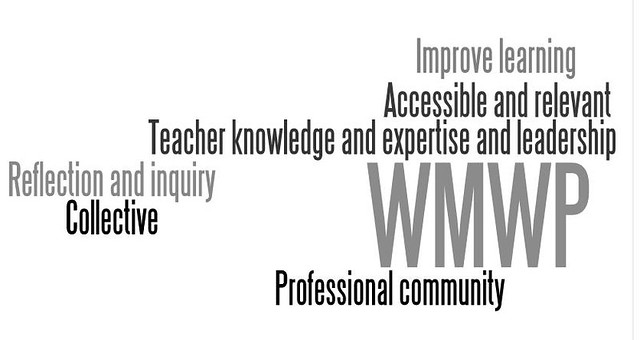
Yesterday, members of the Western Massachusetts Writing Project leadership team met to begin a discussion about the future of our organization now that federal support for the National Writing Project has disappeared. It’s an uncertain time for us, and for all NWP sites. And the discussion is sure to stretch into next year.
The activity that started us off was to look deeper at our WMWP Mission Statement, which we developed last year after a year of inquiry work, and which now is something that we see as our guide forward. We spent a lot of time, and a lot of reflective thinking, on the writing of the mission statement. As we struggle with where funds should go, and how to gain more support, our site director, Anne Herrington, reminded us that we need to maintain the values that we hold dear in the WMWP. The mission statement can help us in this regard.
We spent some time reading the mission statement and pulling out words and phrases that seemed most important, or most central, to us. Then, we shared out those phrases and discussed what they meant. The Wordle above are some of the central ideas that came out of that discussion.
This is our full mission statement:
The mission of the Western Massachusetts Writing Project, a local site of the National Writing Project, is to create a professional community where teachers and other educators feel welcomed to come together to deepen individual and collective experiences as writers and our understanding of teaching and learning in order to challenge and transform our practice. Our aim is to improve learning in our schools — urban, rural and suburban.
Professional development provided by the Western Massachusetts Writing Project values reflection and inquiry and is built on teacher knowledge, expertise, and leadership.
Central to our mission is the development of programs and opportunities that are accessible and relevant to teachers, students, and their families from diverse backgrounds, paying attention to issues of race, gender, language, class and culture and how these are linked to teaching and learning.
We then began to talk about what programs represent those ideas. We’re trying to determine which areas of WMWP should remain the central backbone of who we are and what we do. It was decided that the Summer Institute, the English Language Learners network, our Best Practices conference, professional development with schools and continuity programs for teachers must remain a top priority.
The message that came out from the meeting is: we’re down but not out, and we will find a way not only to survive, but to thrive. I don’t think we are afraid to change, as long as we keep the values of our program alive. Coming at it from that angle gives a clearer sense of possibilities, I think.
Peace (in the writing projects),
Kevin
